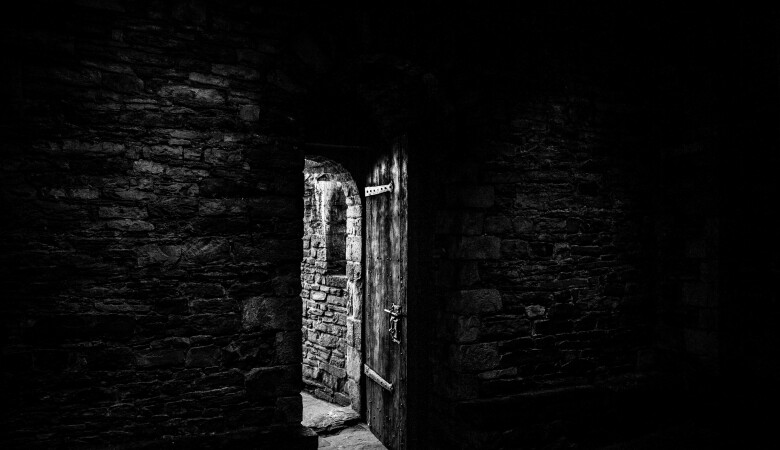Series: Mark
Your Destiny Hangs on this Question (Mark Sermon 38)
January 22, 2023 | Andy Davis
Mark 8:27-33
Deity of Christ, Worship
The single most important question you will ever face came from Jesus Christ, "Who do you say that I am?”.
- SERMON TRANSCRIPT -
Turn in your Bibles this morning to Mark 8: 27 -33. I'd also like to ask you also to look at the parallel passage in Matthew 16: 13-23. I don't do this every week, but this week in particular, I want to be walking in a parallel way through both of these passages, but of course giving priority to the gospel of Mark.
I. A World Full of Questions
As we look at this text, we come to the most significant question any of us could ever face in our lives. We face questions every day of our lives. Some of them are completely mundane and trivial like, "What should I have for breakfast?" Some of you say, "No, pastor, that's a significant question right there." Or, "What should I wear to church today? Should I wear the blue sweater or the green one? I know I'm going to be wearing a sweater today so I don't have to iron the shirt underneath the sweater so I know that decision has been made, but which sweater? How shall I drive to church on a Sunday or to work tomorrow morning? What does the traffic report say? What's the forecast? Is it going to be hot or cold? Is it going to be rainy or not?" Et cetera. Trivial questions.
Some questions are more significant, we understand that. Like some of the questions you young driver candidates are facing that you're going to face at the DMV so that you can get your license. You need to be ready to answer those questions or questions that you face on the SAT or the GRE or other things, the questions law students face on the bar exam. Or what young families will do with their budget, how they will spend their money, aspects like that.
Some questions really do shape our entire lives or are weightier than any of these. A high school senior that has to decide which college she'll go to. She’s been accepted to three or four colleges, which ones should I choose? I need wisdom for that. More significantly, you married women can think back to a time when there was a man on his knee in front of you asking you the significant question, "Will you marry me?" and that has shaped your life because you said, yes. Your whole future life, in some ways, hung in the balance there. Or the question that your moms would ask the ultrasound technician, "Is it a boy or a girl?" Or the question a father should ask, "Should I get a different job? I’m not making enough money, What should I do about my financial income?" Or the anxious question a senior may ask a doctor, "Is it cancer?"
There are some worldview questions that stand over all of us. I shared these this past Wednesday: creation, fall, redemption. Creation: Where does everything come from? The Fall: Why is everything so messed up? Why is there such corruption and wickedness in the world? Redemption: Where can we go to see those problems solved? More personally, is there purpose in my life? Is there any reason for my existence? What will happen when I die? All these are very significant worldview questions.
II. The Most Important Question in the History of the World
In the text, as I said, I believe the most significant question any individual can ever face stands before us here. In this text, Jesus Christ stands before individual people, all of us in the text and asks you, "What about you? Who do you say that I am? What about you? Who do you say that I am?" I believe your eternal destiny hangs on the answer to that question. Whether you'll spend eternity in heaven or hell, depends on your answer to that question. Eternity in heaven, a place that can barely be even imagined for its beauty, a world free from death, mourning, crying and pain, a perfect world. Will you spend eternity in that beautiful and perfect world? Or conversely, will you spend eternity, wailing and gnashing your teeth in anguish, and agony, as Jesus taught, about eternal conscious torment in hell? Those are the two destinies, one destiny or the other for each one of you that listens to me, and I believe your answer to this question, "What about you? Who do you say that I am?", determines whether it's going to be heaven or hell for you.
The Gospel of Mark, I believe, was written to give you everything you need to make the right confession of Jesus. And not just Mark, but Matthew and Luke and John. All four of those Gospels give you everything you need to make, from your heart, by faith, this confession, "You are the Christ, the Son of the living God." The context of this question is a retreat Jesus went on with his apostles. The location is given, Caesarea of Philippi, about 25 miles northeast of the sea of Galilee, 40 miles southwest of Damascus on a beautiful plateau near the headwaters of the Jordan River. Nearby a few miles to the north was Mount Herman, generally snow covered, over 9,000 feet tall. Caesarea Philippi was originally named Paneas after the Greek nature god, Pan, who according to Greek mythology, was born in a cave nearby that region. Caesar Augustus gave the region to Herod the Great, Herod's son. Philip the Tetrach named the city, Caesarea, after Caesar, and Phillipi after himself. So that's where they were. It was a few miles from the ancient Jewish region of Dan, the northernmost tribe of Israel. Surrounded by Gentiles, therefore more of a cosmopolitan area, a crossroads where Jewish and pagan culture met.
For Jesus, it was a retreat from the urgent demands of the crowd and from the plots and schemes of his hateful and murderous enemies. The crowds, relentless demands for healing and for feeding, constantly. Some of them, in John 6, zealously wanted to take Jesus by force and make him king. King Herod probably wanted to kill him as he did John the Baptist. The Pharisees, Scribes and priests definitely are plotting to kill him by this point, so Jesus withdrew to Tyre and Sidon first and now to this Gentile region next. It's a retreat, but it's also an opportunity for Jesus to focus on the twelve, the training of the twelve. A.B. Bruce wrote a classic on the training of the twelve. You get that picture of Jesus, touching the lives of his apostles and shaping them as a potter shapes the clay. He's got time with the twelve apostles. They were, humanly speaking, the centerpiece of his strategic plan to take the gospel to the ends of the earth, including to Gentile nations. His methodology includes asking probing questions and beginning some kind of dialogue based on those probing questions.
Look at verse 27, “Jesus and his disciples went on to the villages around Caesarea of Philippi. On the way he asked them, ‘Who do people say I am?’” He starts this question, this topic. The topic is, “Who am I?” and He starts it by getting current opinions, popular opinions. We have to be aware of the focus of Jesus's questioning, “Who am I?” Is this a vital topic? In one sense, Jesus was the most self-centered teacher in history. Everything ultimately revolved around Jesus. This was not pride or ego on his part, not at all. It has to do with who He is and how our understanding of who He is fits into God's salvation plan. He said self-centered things all the time, such as, "I am the bread of life" or, "I am the bread that came down from heaven. If you feed on me, you'll live forever.” "I am the spring of living water. Come to me and drink if you're thirsty.” “ I am the light of the world. Whoever follows me will not walk in darkness but will have the light of life.” “ I am the good shepherd and I lay down my life for the sheep.” “ I am the way, the truth and the life. No one comes to the Father except through me.” “ I am the vine. You are the branches. If you remain to me, you'll bear much fruit. Apart from me, you can do nothing.” “ I am sending you many prophets and righteous men and teachers, some of them you'll kill and crucify."
Who would ever say that, "I'm sending you prophets?" Who does that, but God? "I am the Lord of the Sabbath." Jesus was the most self-centered teacher in history. But again, not through ego or pride, Jesus knew who He was and He knew that salvation consisted in knowing him, as He prayed to his own father in John 17: 3, "Now this is eternal life; that they may know you, the only true God and Jesus Christ whom you have sent." That is eternal life, that they may know Jesus Christ. He especially said this plainly to his enemies and He warned them concerning this, they must know and believe his true identity or be eternally lost.
In John 8:24, Jesus said, "I told you", to his enemies, "I told you that you would die in your sins." That means go to hell. To die in your sin means to be condemned to hell. "I told you that you would die in your sins for if you do not believe that I am, you will die in your sins." What does that mean? "If you do not believe that I Am, you will die in your sins.” "I Am", the Jews knew, that's God's name. He is the I Am out of the burning bush when Moses says, "What shall I say is your name?" "Tell them, I Am who I Am. I Am has sent me to you.” In that same chapter, John 8, He said, "You must believe that I Am or you'll die in your sin”. At the end of that whole exchange, He said, "I tell you the truth, before Abraham was born, I Am." It's an open claim to deity. He says in John 8:24, "You have to believe that or you're going to die in your sins."
So with his disciples at Caesarea of Philippi, He's going to zero it on that topic, the most important topic, who am I? He gets current opinions on this. What are people saying about me? He wanted the disciples aware of the current opinions about Jesus. Who do people say that I am? Essential to their mission would be to proclaim the truth and to correct false understandings of Jesus. So also our mission today, there are many false opinions about Jesus. “Who do people say that I am?” They give their answers. In verse 28, they replied, "Some say John the Baptist, others say Elijah and still others, one of the prophets." That's an interesting list of opinions. There's obviously no way that Jesus could be John the Baptist. I mean, the two of them had a conversation. I would think that would settle it. Jesus showed up where John was baptizing and John baptized him, so that settles that. But king Herod thought that John was raised from the dead, and Jesus' miracles are proof of that, but that’s not possible.
Others brought in that prophecy about Elijah. You remember Elijah, the mysterious and powerful prophet of God who ascended to heaven in a chariot of fire. Malachi gives a clear prediction or prophecy that Elijah would come before the great and dreadful day of the Lord in Malachi 4:5. So maybe Jesus is Elijah. Others thought it's just one of the prophets. In Matthew's account, they say Jeremiah. There's no promise that Jeremiah would come back, but God can do that. Maybe He's brought Jeremiah or one of the other prophets back.
But as I said, no prophet ever said the kinds of things Jesus said. No prophet would ever make this statement, "Heaven and earth will pass away, but my words will never pass away.” No prophet would claim to be Lord of the Sabbath. No prophet would claim, "I'm sending you prophets." So then we get to the most important question in the history of the world, Mark 8:29, “ What about you? Who do you say that I am?" Jesus zeroes in on them, the twelves, they've been with him for several years now. They've seen him do literally thousands of miracles, huge populations of people have come and been healed. They've seen it. They've watched at every move, they've heard as every word. They don't need any more information. The time has come for them to face this question, "Who am I?” John 3:36 says, "Whoever believes in the Son has eternal life, but whoever rejects the Son will not see life for God's wrath remains on him." So it's life or wrath, based on whether you believe in and accept the Son.
"So it's life or wrath, based on whether you believe in and accept the Son. "
III. Peter’s Greatest Moment: The Mouthpiece of God
At this moment, Peter steps up, and this is one of, if not Peter's greatest, moment as the mouthpiece of God. Peter speaks for all believers of all time, he speaks for the twelve, he often did that. They'd all be thinking something, but Peter would say it. Peter was a natural born leader, a leader of men. He would venture forward, that's who he was, and he would speak. Now, moved by the spirit of the Father, Peter spoke for all believers throughout all ages, but what did he say? In Mark's gospel, Mark 8:29, this is what it says, “Peter answered, ‘You are the Christ.’”
That's a significant statement. “You are the fulfillment of all that our nation has been waiting for. The fulfillment of all the prophecies that a son of David would come and sit on David's throne and reign on David's throne over his kingdom.” It's a very significant statement, but it obviously falls far short of fullness of understanding. Many Jews of that day would be ready to say that Jesus was the Christ but not understand his deity. They would think He was just a human descendant of David in the genealogy ready to come like David reigning on a human throne. But the fullness of his identity as God in the flesh, is not obvious in this truncated confession ascribed to Peter in the Gospel of Mark.
So now we have to do the hard work of New Testament theology and exegesis. We are innerrantists at this church. We believe that every word of scripture is perfect, everything scripture asserts is true. We also believe that none of the four Gospels is exhaustive. John says, “Jesus did lots of things not recorded in this book.” So there are lots of things that happened that didn't get written. All of them are truncated to some degree. We have to harmonize Matthew's account and Mark's account. Whenever any of the four Gospels, Matthew, Mark, Luke, or John gives us additional perceptual historical information, we accept it and harmonize it. It's true, it happened. The fuller confession comes in Matthew's Gospel. If you're there on the page, you can see it, Matthew 16:16, "Simon Peter answered, ‘You are the Christ, the Son of the living God.’" The Son of the Living God, Peter said that at that moment.
This is fascinating for me as a student of the Gospel of Mark, because I believe this is the purpose statement of the entire Gospel of Mark. Mark 1:1, “The beginning of the gospel about Jesus Christ, the son of God.” We don't have to wonder what the Gospel of Mark is written to do to bring us to that place where we can say He is the son of God. Then to some degree, the climax of the entire gospel, as Jesus has just died, the centurion who stood there in front of Jesus, heard his cry, saw how He died, and said, "Surely this man was the son of God." That's like the Alpha and the Omega, really pretty much. The beginning of the gospel of Jesus, the Son of God. Then as He dies, "Truly this man was the son of God." Now in the middle, right in the center, we have this opportunity for Peter, who parenthetically, New Testament scholars surmise, that the Gospel of Mark is to some degree Peter's gospel. That Mark was Peter's secretary. We don't know that for sure, but it's quite possible.
Why would he truncate, led again perfectly by the Holy Spirit? Why just say, "You are the Christ"? Here's my official answer, I don't know. I don't know. There's a perfect reason why, I can guess like all of you at the reason, but I don't know for sure. I just know he did. But let me speculate, for what it's worth. The real issue here is the full revelation of the person of Jesus by the spirit of the Father to individual sinners, understanding who Jesus is. We get that from Matthew’s Gospel. We'll talk about that in a minute. But it's pretty clear that whatever Peter said at that moment, he didn't fully understand it. He didn't fully understand that Jesus was the son of the living God. Why do I say that? Because moments later, he's rebuking him.
Can I just say it is a bad idea to rebuke the Son of the living God? But both of those happened. I would guess, perhaps, the Holy Spirit led Mark to truncate because even though it is the theme of the whole Gospel, and even though Peter's a centerpiece of it, he didn't fully understand it at that moment. In humility, he held back from the full revelation, knowing the spirit knew that the full confession would be in Matthew's Gospel. What it says to me is, and I'm going to make this application at the end of the sermon, we all similarly have to go beyond a slogan, beyond words only, to reality. What it really means for us is that Jesus is the son of living God. We'll get to that at the end of the sermon. The center issue here is the revelation of the identity of Jesus to your soul.
Jesus said this when Peter made that confession, “You are the Christ, the Son of the living God.” "Blessed are you, Simon, son of Jonah. For this was not revealed to you by man, but by my father in heaven." It is by revelation, direct revelation by God the Father to the sinner. By that means alone can we make that confession from our hearts. This is the most blessed state a sinner can ever reach here on earth, is to have God the Father, reveal Jesus to you so you understand who He really is, and He does this by the Holy Spirit. You can't do this to yourself. Naturally, all of us are spiritually blind, especially to Jesus. We don't see his glory. But when God chooses to, He can take away your blindness, the blindness of your soul and show you the glory of God in Christ.
Jesus said in John 6:44, "No one can come to me unless the Father sent me." He draws him, I would say, based on what He said to Peter in Matthew 16:17, "No one can come to me unless the Father who sent me reveals me to him." God the Father has the power to give, as Jonathan Edwards put it, "A divine and supernatural light directly imparted to your soul." And what is that? 2nd Corinthians 4:6 tells us what it is, “ For God who said, let light shine out of darkness, made his light shine in our hearts to give us the light of the knowledge of the glory of God in the face of Christ, that God is glorious in Jesus.” That's a light that shines in the heart of every truly born again person. When God shines that light, similar to the original physical light at creation, when God said, "Let there be light", when He shines that spiritual light inside you, He also says, "Let there be sight." The sight of the heart of the soul is faith. You can see the invisible glory of God in Christ in Matthew, Mark, Luke, and John. You see it and you're justified by faith. You're forgiven of your sins. That's salvation. My question is, has that happened to you? Has God revealed his own glory in Christ to you? Is that light shining in your soul and do you see it? So that's what happened.
Then Jesus, continuing the account in verse 30, warns them not to tell anyone about him. This is one of a regular pattern of these warnings. “Don't tell anyone. Don't tell anyone, don't tell anyone.” As I've said again and again, I pick up the Bible and say, here it is on the page. That was just temporary, He wants everyone to know about this. But at that time, He wanted it held back. Again, we can guess at the reasons, but it's just He had his purpose for that restriction.
IV. Jesus’ Shocking Warning
At that point, then Jesus gives a shocking warning. At this moment in history, He begins to explain to his apostles, what's going to happen. Look at verses 31, 32, “ He then began to teach them that the son of man must suffer many things and be rejected by the elders, chief priest and teachers of the law, and that he must be killed. And after three days rise again.” He spoke plainly about this.
Matthew makes it clear that it was at this point and repeatedly from then on [Matthew 16:21] from that time on, Jesus began to explain these things to his disciples. Why did He do this? Many reasons, but primarily because those apostles, none of them were expecting this, at all. None of them were. It didn't compute in their understanding of the kingdom. Jesus wants to tell them ahead of time so that when it happens, they won't lose their faith. It's going to be the greatest trial of their faith, of their entire lives. When Jesus gets arrested, beaten, and killed, He wants them to know that this is all part of his plan. He says in John 14:29, "I've told you now, before it happens. So when it does happen, you will believe." He wants to give them warnings.
There's many other reasons why He says his arrest and death is going to try them, deeply. He wants to get out ahead of it and predict it and say, "Look, this is not an accident. I'm not a victim. I'm not trapped. I'm not surrounded by a net that I didn't see coming. No one takes my life from me. I lay it down freely of myself." [John 10]. I'm not going to get trapped. I'm dying on purpose.”
V. Peter’s Worst Moment: The Mouthpiece of Satan
A moment ago I said, this was Peter's greatest moment as the mouthpiece of God. Now we have Peter's worst moment, or among them, there's a number of candidates. But among them, this, his worst moment, a mouthpiece of Satan. How can he, in such a short time, in mere moments, go from being a mouthpiece of God to being a mouthpiece of Satan? Verse 32, “Peter took him aside and began to rebuke him.” Matthew tells us what he said, "Never Lord. He said, this shall never happen to you." Here we see Peter's arrogance exposed. Can I ask you a question? Why do you think Peter took Jesus aside to do it? Perhaps you've never thought about that before. What an awkward and weird moment in redemptive history. "Jesus, do you have a moment? Just you and me in private? I have something I want to say to you. Just come here, just you and me." Why does he do that? You want to know why? He wants to spare Jesus' reputation. He wants to spare him the embarrassment because he's clearly wrong about this death thing. “Let's see if we can get this fixed, just the two of us and we'll go back and you know, you can take that back, kind of walk that whole thing back.” So he takes him aside and rebukes the son of the living God.
How can this be? How can he actually say, "Son of the living God", and then in moments later be rebuking him or correcting him? Sadly, rebuking God is something all of us sinners do. Sadly, regularly, we rebuke God and we correct God when we think He's wrong, when we think He's done something in our lives or in the world that's wrong and we question him and challenge Him as in the Book of Job. It's very common. But consider these words in the beautiful doxology in Romans 11, "Oh, the depths of the riches of the wisdom and the knowledge of God. How unsearchable his judgments and his path beyond tracing out. Who has known the mind of the Lord or who has been his counselor?" What do those words mean to you? God doesn't need your advice. He doesn't need your counsel. He didn't need Peter's counsel at that moment. It's arrogant for us to think we can give God any kind of council or advice. It's like Job, when God answered Job out of a whirlwind, remember in Job 38, "Who is this that darkens council by speaking words without knowledge?" …brace yourself like a man. I will question you and you will answer me. Where were you when I laid the foundations of the earth? Tell me if you understand.” You can see the same thing here with Peter arrogantly thinking to rebuke Jesus.
"Sadly, regularly, we rebuke God and we correct God when we think He's wrong."
In so doing, you must understand Peter is speaking out against his own salvation, isn't he? He's speaking out against his own salvation. If Jesus doesn't go to Jerusalem and be arrested by the chief priest, teachers in the law, and be condemned to death by them and then by the Gentiles mocked, flogged and crucified and dead, and his blood shed on the cross, we all will spend eternity in hell. There is no other hope. There is no other salvation than Jesus being the lamb of God that takes away the sins of the world. We sang earlier this morning, "Lover of my soul”. “I want to live for you, lover of my soul.” That's Jesus. He is the lover of Peter's soul and to love his soul to the uttermost, He has to die for him, and He knows that. Peter doesn't understand that. Later, Jesus will get ready to wash Peter's feet. Peter stopped him and said, "You'll never wash my feet." And Jesus said, "Unless I wash you, you have no part with me." We would say the same thing about the cross, only even more so, it's actually the same thing. "Unless I bleed for you, you cannot have any part with me. You cannot be with me in heaven."
Later, after Jesus's resurrection, ascension, coming of the Holy Spirit at the Pentecost, Peter's continued development and the time came for him to write his epistle, First Peter, he clearly understands substitutionary atonement by then. First Peter 3:18, “For Christ died for sins, once for all the righteous, for the unrighteous, to bring you to God. He was put to death in the flesh, but made alive in the spirit.” He understood it. “I get it now. Jesus has to die.”
So then, Jesus turns and rebukes Peter and He does it in front of everybody. Peter took Jesus aside privately. Jesus doesn't do this rebuke privately, He rebukes Peter publicly in front of everybody. Look at verse 33, "But when Jesus turned and looked at his disciples, he rebuked Peter, ‘Get behind me, Satan. You do not have in mind the things of God but the things of men.’" He wanted all the disciples to hear this rebuke of Peter because undoubtedly Peter was speaking for all of them when he vigorously rejected the concept of Jesus dying in Jerusalem. He said in verse 33, "You do not have in mind the things of God but the things of men." All of them did. They all had human conceptions of the kingdom they are going up to Jerusalem to establish. They’re all going to be sitting on fine seats. “Jesus gets the best seat, but some of us are going to sit at your right and your left and the rest are sitting around you, and we're going to rule the world. We're going to be on comfortable thrones, and we're going to be sitting in silk and we're going to be eating whatever we want at the banquet table every night, and we are going to rule the world.” Your thoughts of the kingdom, Jesus would say, are far too human. “My kingdom is not of this world. You don't understand what you're thinking about.” They're thinking of a human glory, a human power, a human wisdom, human sensual delights. That's what Peter was thinking about and they're all thinking about that. But to begin the rebuke, what does Jesus say? “Get behind me, Satan.” Wow, that's a shock. “Get behind me, Satan.” He said to Peter, "Get behind me, Satan."
It's reasonable for us to ask, based on this text, what is the connection between Satan and Peter at that moment? It's pretty clear biblically and also practically experientially. Satan has the power to insinuate thoughts into the human mind. He does not have the power to make you pull the trigger on them, act on them, speak them. But he does have the power to put them in your mind. This is the essence of the flaming arrows that he shoots. He has that power. Now, we are always responsible for what we say and do, but at that moment, Peter was speaking Satan's words for him.It reminds me of Job's wife. Remember in Job chapter 1 and Job chapter 2, Satan's program was to get Job to curse God to his face. After the assault on Job's body, the second assault, when Job is sick, his wife comes to him and says, "Are you still holding onto your integrity? Curse God and die.” Whoa, whoa, where'd that come from? Curse God? She was speaking Satan's words for him at that moment. Satan can do that.
In Second Timothy 2:26, Paul talks to Timothy about disputes within the church, and tells him that he’s going to have people that are going to disagree with him. People are going to oppose him, sometimes very vigorously. Paul told Timothy to deal with them gently and patiently [2nd Timothy 2,] in the hopes that they'll come to their senses and escape from the trap of the devil, listen, who has taken them captive to do his will.
Satan can take people captive temporarily to do his will, including speaking his words. Let me just say to all of you and to myself, be very careful what you say in moments of stress, because Satan, through demons will be insinuating thoughts in your mind and you might say something you don't believe is true or something that just has popped in your mind and then you say it and you can't unsay it. So be very, very careful at moments like that as Psalm 141: 3-4, "Set a guard over the door of my mouth, oh Lord. Keep watch over the door of my lips. Let my not my heart be drawn to what is evil." Okay? But let's go even deeper.
What was Satan thinking at this moment? This is really amazing. Satan was tempting Jesus to not go to the cross. This makes sense because he's going to oppose whatever Jesus wants to do. But later, Satan is going to inhabit Judas to betray Jesus to the cross. Which is it Satan? Are we trying to get Jesus to not go to the cross, as in Matthew 16 and Mark 8 or are we trying to trap Jesus so that He would go to the cross, as in Judas Iscariot? In John 13, Jesus said very plainly, “'I tell you the truth, one of you will betray me." They were all troubled. And then John laying on Jesus's breasts at the last supper said, ‘Which one?’ And he said in John 13, ‘It is the one to whom I will give this piece of bread when I've dipped it into the dish", then dipping the piece of bread, he gave it to Judas Iscariot son of Simon. As soon as Judas took the bread, Satan entered into him. Jesus said, ‘What you're about to do, do quickly.’" And he goes out and it's night. What does he go out to do? Betray Jesus to his death.
I meditated on this years ago. What does Satan want? Does he want Jesus to go to the cross or not? It's what I call satanic confusion. He's playing checkers and God is playing chess or some game infinitely higher. Satan's smart, God is omniscient. Here's the incarnate son of God in a human body, physically on earth and he can die. It's possible for him to die. The question is for Satan, should I kill him or not? Should I kill him or not? Should I kill him or not? Should I kill him or not? In Caesarea of Philippi he's like, "Let's tempt him not to die”. But then in the end, I would say it this way, he can't help himself. Why? Because he is a murderer and he's going to do his basic nature. He's going to kill the Son of God, and in so doing, hallelujah, destroy his own dark kingdom.
1st John 3:8, “The reason the son of God appeared was to destroy the devil's work.” Hebrews 2:14 -15, “so that by his death[ Jesus] death, he might destroy him, who holds the power of death, that is the devil, and free those who all their lives were held in slavery by their fear of death.” So when Satan orchestrated Jesus' death, he destroyed himself. But in the wisdom of God, God ordained a long, slow, very long, very slow death for Satan in his kingdom. Praise God. But that's what's going on, satanic confusion.
VI. Lessons
Let's go back to how I began. Focus on the most important question, and it is your most important question. Every single one of you listening to me today has an eternal soul. Every single one of you will spend eternity either in heaven or hell. It is not hard for me to prove biblically, I'm not making an overstatement, your eternal destiny depends on your heart conviction about Jesus Christ. If you can confess from your heart, with Peter, "You are the Christ, the son of the living God", then you are blessed by the Father, and you'll spend eternity blessed by my Father. Take your inheritance, the kingdom prepared for you since the creation of the world, blessed by God if you can make that confession. If you have not yet made that confession, I am pleading with you and the eternal weight of your soul. Come to Christ. You have all the evidence you need in Matthew, Mark, Luke, and John, read it. Spend this afternoon. If you're not yet convinced, read one of the gospels straight through. There is nothing more important, as Jesus will say later in this chapter, "What would it profit someone to gain the whole world and lose his soul?"
I'm begging you, come to Christ. For us, all of us, we need to be aware of current opinions on Jesus. What are people saying about Jesus? Lots of weird stuff. I've got all kinds of quotes here, but I put a big X across it so I'm not going to read it. They're like, "Oh, pastor, what were they?" Someone can come up and swipe it at the end, it will be right here. But I tell you what, people have all kinds of lighthearted things to say about Jesus. Jesus has generally a good reputation in the world. We could sum it all up under one heading, good moral teacher. But Jesus, as CS Lewis proved, is not merely a good moral teacher if he claimed to be God. He either is God or he's a liar or insane. He's not merely a good moral teacher.
We need to understand that. We need to be instruments in the hands of God the Father through the spirit to bring lost people to the point of confession, "You are the Christ, the Son of the living God." How do we do that? Tell them about Jesus. Tell them miracle stories. Seriously this week, choose a miracle story, a healing, walking on the water, stilling the storm, something, and tell it to a lost person this week and see what happens. See what kind of conversations you can get into. You can start talking to people about worldview. Start that way. Don't say worldview, they'll be all upset. But say, "I have a couple questions for you. Where do you think everything came from? And why do you think everything's so messed up?Where do you think we're going with all that? How do you determine ultimate purpose and meaning for your life? What do you think happens when you die?"If you ask those questions, you're going to get to the gospel. Then tell them the greatness of Christ so that they can make that confession.
"We need to be instruments in the hands of God the Father through the spirit to bring lost people to the point of confession, 'You are the Christ, the Son of the living God.'"
One last thing I want to say is we are a knowledgeable church doctrinally instructed. I think it's a warning to us that we can make a verbal confession and not really truly understand what it means. So I'm urging you go beyond the slogans of "You are the Christ, the son of the living God" to the reality of Christ alive within you. The hope of God. Close with me in prayer.
Father, we thank you for the time we've had to walk through this complex multifaceted passage, and it's vital, oh Lord, for us. Help us, oh Lord, to understand what you're teaching us, to understand the truth of the confession that Peter made and how it only happens when God directly reveals and imparts a divine and supernatural light to our souls. Help us as evangelists to be willing boldly here in the Raleigh Durham Chapel Hill area to speak the gospel so that people can make that confession in front of all of us in water baptism. Oh God, make us evangelists, make us bold, Lord, for all of us who have already been saved, help us just to be deeply thankful, knowing that it's only because of your sovereign grace that we ever made that confession. In Jesus' name, amen.































